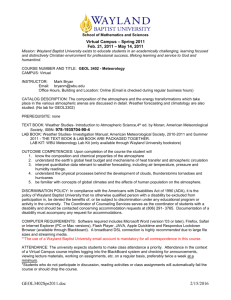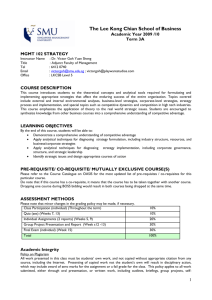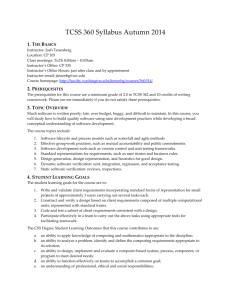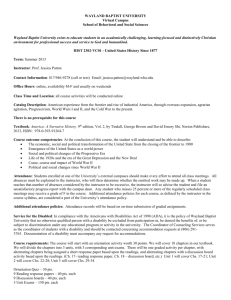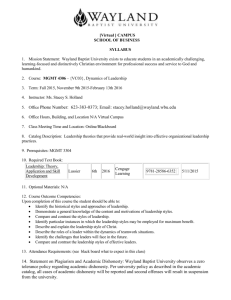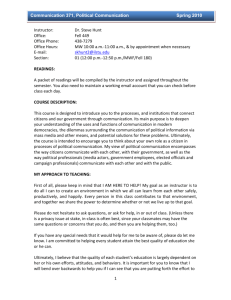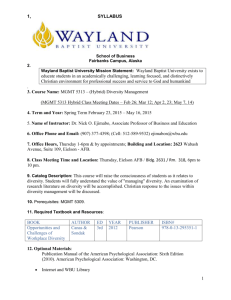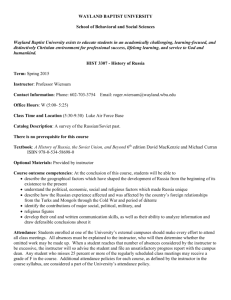Partnering with Parents - Wayland Baptist University
advertisement
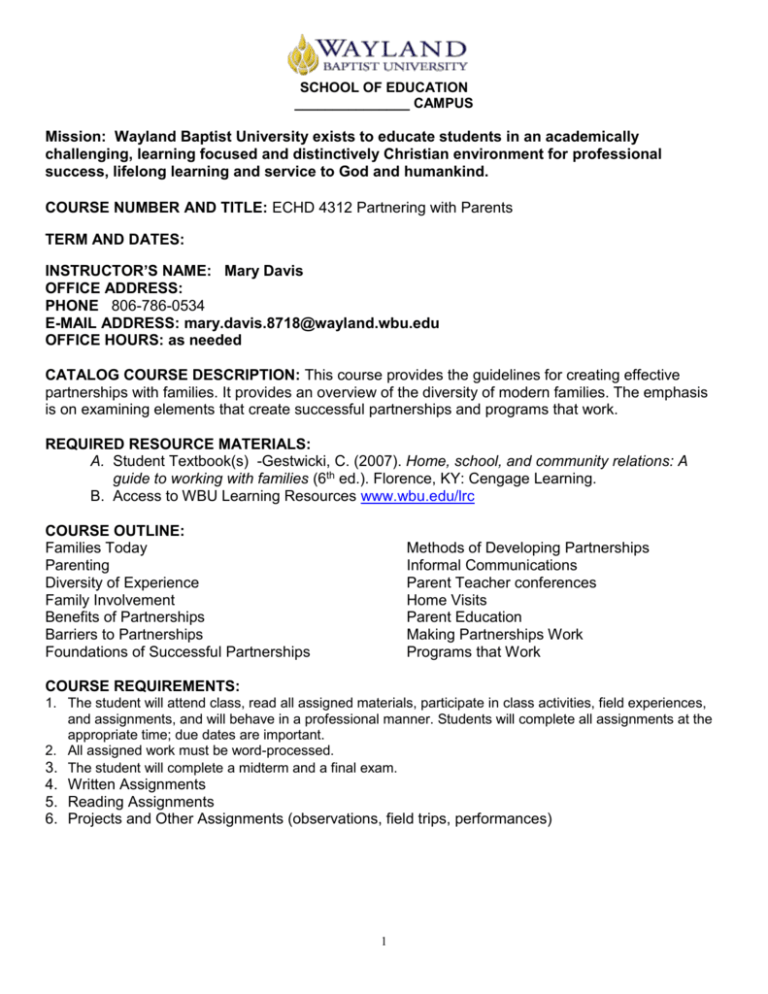
SCHOOL OF EDUCATION _______________ CAMPUS Mission: Wayland Baptist University exists to educate students in an academically challenging, learning focused and distinctively Christian environment for professional success, lifelong learning and service to God and humankind. COURSE NUMBER AND TITLE: ECHD 4312 Partnering with Parents TERM AND DATES: INSTRUCTOR’S NAME: Mary Davis OFFICE ADDRESS: PHONE 806-786-0534 E-MAIL ADDRESS: mary.davis.8718@wayland.wbu.edu OFFICE HOURS: as needed CATALOG COURSE DESCRIPTION: This course provides the guidelines for creating effective partnerships with families. It provides an overview of the diversity of modern families. The emphasis is on examining elements that create successful partnerships and programs that work. REQUIRED RESOURCE MATERIALS: A. Student Textbook(s) -Gestwicki, C. (2007). Home, school, and community relations: A guide to working with families (6th ed.). Florence, KY: Cengage Learning. B. Access to WBU Learning Resources www.wbu.edu/lrc COURSE OUTLINE: Families Today Parenting Diversity of Experience Family Involvement Benefits of Partnerships Barriers to Partnerships Foundations of Successful Partnerships Methods of Developing Partnerships Informal Communications Parent Teacher conferences Home Visits Parent Education Making Partnerships Work Programs that Work COURSE REQUIREMENTS: 1. The student will attend class, read all assigned materials, participate in class activities, field experiences, and assignments, and will behave in a professional manner. Students will complete all assignments at the appropriate time; due dates are important. 2. All assigned work must be word-processed. 3. The student will complete a midterm and a final exam. 4. Written Assignments 5. Reading Assignments 6. Projects and Other Assignments (observations, field trips, performances) 1 COMPETENCIES FOR THIS COURSE: Students possess knowledge and understanding of family and community characteristics. Students understand how to build positive relationships, taking families preferences and goals into account and incorporating knowledge of families’ languages and cultures. Students consider family members to be resources for insight into their children, as well as resources for curriculum and program development. Students understand that their relationships with families include assisting families in finding needed resources that may contribute directly or indirectly to their children’s positive development. Students understand how to go beyond parent conferences to engage families in curriculum planning, assessing of children’s learning, and planning for children’s transitions to new programs. STUDENT LEARNING OUTCOMES: Students will demonstrate a variety of communication skills to foster relationships, emphasizing informal conversations while also including such approaches as exchanging emails and posting information and children’s work on the Web. Students given a specific problem will identify community resources and develop a plan for the family to obtain the needed assistance. Define parent involvement and describe perspectives and history of parent involvement in early childhood programs and schools. Demonstrate techniques and practices for developing effective parent partnerships. Construct activities for involving parents in early childhood programs. Identify and explain advocacy roles of teachers, parents, community, and government. Demonstrate sensitivity to problems and issues confronting families with young children. Demonstrate an understanding of the functions and services offered by social service agencies, support services, and clinics in the local community, the State, and on the National level. Construct a resource file to be used when referring families to outside MEANS FOR ASSESSING STUDENT ACHIEVEMENT OF THE OUTCOME COMPETENCIES: Rubric is used to evaluate role playing of various problems and situations. Development of plan to obtain assistance for specific problems. Development of a resource book for community, state and national services. ATTENDANCE POLICY: 1. Campus Attendance Policy: Students enrolled at Wayland Baptist University should make every effort to attend all class meetings. The University expects students to make class attendance a priority. All absences must be explained to the instructor who will decide whether omitted work may be made up. When a student reaches a number of absences considered by the instructor to be excessive, the instructor will so advise the student and file an Unsatisfactory Progress Report in the office of the dean. Any student who misses twenty-five (25%) or more of the regularly scheduled class meetings will receive a grade of F for that course. Student grade appeals should be addressed, in writing, to the campus dean. 2. Instructor’s Additional Policies: 2 METHODS OF INSTRUCTION: EVALUATION: University Grading System: A grade of “CR” indicates that credit in semester hours was granted but no grade or grade points were recorded. *A grade of incomplete is changed if the work required is completed prior to the date indicated in the official University calendar of the next long term, unless the instructor designates an earlier date for completion. If the work is not completed by the appropriate date, the I is converted to the grade of F. An incomplete notation cannot remain on the student’s permanent record and must be replaced by the qualitative grade (A-F) by the date specified in the official University calendar of the next regular term. EVALUATION: University Grading System (see Catalog) A 90-100 Cr for Credit B 80-89 NCR No Credit C 70-70 I Incomplete* D 60-69 W for withdrawal F below 60 WP Withdrawal Passing WF Withdrawal Failing given X No grade IP In Progress COURSE GRADING CRITERIA: Grading Rubric Assignment Possible Assignments 300 Project Test (2) 100 pts each 300 200 TOTAL Earned 800 ACADEMIC HONESTY: University students are expected to conduct themselves according to the highest standards of academic honesty. Academic misconduct for which a student is subject to penalty includes all forms of cheating, such as illicit possession of examinations or examination materials, forgery, or plagiarism. Disciplinary action for academic misconduct is the responsibility of the faculty members assigned to the course. The faculty member is charged with assessing the gravity of any case of academic dishonesty and with giving sanctions to any student involved. Penalties may be applied to individual cases of academic dishonesty; see catalog for more information about academic dishonesty. Plagiarism - The attempt to represent the work of another, as it may relate to written or oral works, computer-based work, mode of creative expression (i.e. music, media or the visual arts), as the product of one's own thought, whether the other's work is published or unpublished, or simply the work of a fellow student. When a student submits oral or written work for credit that includes the words, ideas, or data of others, the source of that information must be acknowledged through complete, accurate, and specific references, and, if verbatim statements are included, through use of quotation marks as well. By placing one’s name on work submitted for credit, the student certifies the originality of all work not otherwise identified by appropriate acknowledgements. A student will avoid being charged with plagiarism if there is an acknowledgement of indebtedness.” - Source: http://www.spjc.cc.fl.us/webcentral/admit/honesty.htm#plag 3 DISABLED PERSONS: It is University policy that no otherwise qualified person with disabilities be excluded from participation in, be denied the benefits of, or be subject to discrimination under any educational program or activity in the University. It is the responsibility of the student to disclose and to provide documentation pertaining to the disability so that appropriate modifications may be made. Course Calendar Session Date Classwork Reading November Syllabus 1 2 3 4 5 6 7 8 9 9 November 16 December 1 December 7 December 14 January 4 January 11 January 18 January 25 10 11 February 1 February 6 Basic Instructions Readings from text Readings from text Assignments Autobiography/picture Chapters 1,2,3 Chapters 4,5,6 Family images Chapters 7,8,9,10 Chapters 11,12,13, 14 Respond 2 classmates on discussion board Design a parent education meeting based on readings from chapter 13 Chapters 15,16,17 Case Scenerio, What would you do? Compare and contrast Parent interview Readings from text Readings from text Mid term Chapters 1-10 Project guidelines will be provided Readings from text Children’s books about families Work on project Project is due, Final exam is delivered Final Exam-comprehensive Comparing parent involvement programs from three schools Syllabus from Edison community college was used to shape the learning outcomes and course competencies. 4

